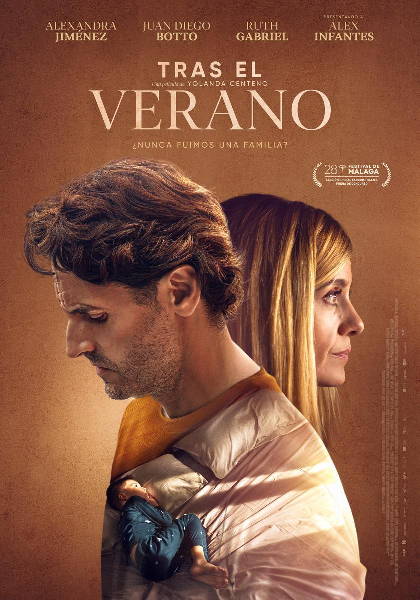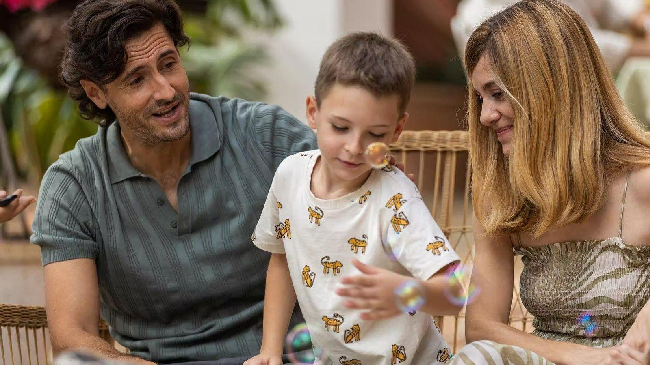Siendo un cinéfilo empedernido desde mi juventud, en estos años de “adulto mayor” (como nos califican), tengo dificultades para acceder al cine, no solamente por la situación de muy limitadas ofertas cinematográficas desde hace muchos años en mi país (Venezuela), y mis “dólares”, sino también por cómo el tiempo de vida apremiante que vivimos, lamentablemente, nos restringe para otras opciones deseadas.
De vez en cuando, tengo la posibilidad de acceder a ciertos filmes recientes, en alguna red de las que llaman “streaming”. Esa fue la oportunidad experimentada ayer: un filme español recientemente estrenado, Tras el verano. De él hare una modesta reseña crítica.

Con gratitud a las circunstancias azarosas, pues no tenía información de este filme, lo descubrí anoche, y eso me hizo sentir bien. Reconozco que hacía mucho tiempo no veía un filme español que me gratificara, desde ciertas películas de Saura, Erice, Cuevas, Almodóvar, Amenábar, Coixet, por nombrar los más representativos para mí desde los años 60 del XX. Disculpen mi desactualización.
Tras el verano resultó ser para mí una satisfactoria obra, el primer largometraje de la directora española Yolanda Centeno, que solamente hasta ahora había realizado tres cortometrajes.
No es nada fácil abordar el asunto (más que tema) de la relación entre paternidad, maternidad y relación de pareja, y creo que ese reto lo asume muy bien la directora y su acompañante guionista, Jesús Luque.
A continuación, comentarios específicos.

Intentando una sinopsis, sin mucho espóiler. Tenemos una relación, en primer lugar, de un marido separado (Raúl) y una mujer (Paula), a la que no se sabe exactamente cómo conoció (aunque pueden hacerse inferencias). De la relación anterior (matrimonio) de Raúl, es hijo Dani, un niño de 5 años, que hará una conexión emocional profunda con Paula, en una suerte de sustitución maternal. Esta tiene una relación homosexual (poco definida en el filme, pero lo cual no es necesario). Su distanciamiento de Raúl, de quien se separa, en conflicto de incomprensión mutua, acendrará la necesidad de la relación sentimental entre Paula y Dani. Y será esta la que definirá la historia, y cerrará el filme.
Entre los valores de <i<Tras el verano, destacaría varios aspectos, que me parecen de relevancia.
Comenzaría por el guion, sin conocerlo, vemos que logra una correlación muy apropiada entre historia y narrativa. Pero, sin la dirección de Yolanda Centeno, no creo que hubiese sido posible alcanzar la calidad narrativa del filme; siendo su primer largometraje, logra en él una coherencia y motivación temática y narrativa de reconocible factura.
Sin pretender hacer una reseña de precisión, resumiría aquí el alma de lo que nos comparte: la dificultad de alguien —en este caso, un hombre (podría haber sido una mujer)— para asumir la relación con su hijo nacido en una relación marital no existente; la complejidad de sus relaciones (la del padre) con una mujer diferente, la cual establece una vinculación vital con el hijo de su amante; la posibilidad de la reconciliación, aunque sea solo circunstancial; la reiniciación emocional del hijo ante la posibilidad de una “madre" real.
Luego, las actuaciones, pocas conocidas para mí, pero vale destacar las de Alexandra Jiménez (Paula), Juan Diego Botto (Raúl), Alejandro López Infantes (el niño). Las actuaciones de ambos adultos es muy efectiva, sobre todo en lo emocional, con gestos y expresión verbal; pero creo que la más relevante es la del actor que hace de Dani, de una gran versatilidad emotiva, que sorprende.
El trabajo cinematográfico de este filme me pareció no solo muy bien logrado, sino más: eficiente. A continuación, una muestra.
https://www.youtube.com/watch?v=Ncq61gDgj98
Referencias:
https://es.wikipedia.org/wiki/Tras_el_verano
https://en.wikipedia.org/wiki/The_Stepmother%27s_Bond
https://www.imdb.com/es/title/tt21861470/
https://www.imdb.com/title/tt21861470/
https://www.filmaffinity.com/ve/film910552.html
![Click here to read in English]
"After the Summer," a Spanish film worthy of our attention
"After the Summer," a Spanish Film Worthy of Our Attention Being an avid cinephile since my youth, in these "older adult" years (as we are called), I have difficulty accessing the movies, not only because of the very limited film offerings in my country (Venezuela) for many years, and because of my "dollars," but also because the pressing life we live unfortunately restricts us from other desired options. From time to time, I have the opportunity to access certain recent films on one of those so-called "streaming" networks. That was the opportunity I experienced yesterday: a recently released Spanish film, After the Summer. I will write a modest critical review of it. With gratitude for the fortuitous circumstances, as I had no information about this film, I discovered it last night, and that made me feel good. I admit it's been a long time since I've seen a Spanish film that has truly gratified me, not since certain films by Saura, Erice, Cuevas, Almodóvar, Amenábar, and Coixet, to name the most representative for me since the 1960s. Please excuse my outdatedness and ignorance. After the Summer turned out to be a satisfying work for me, the debut feature film by Spanish director Yolanda Centeno, who until now had only made three short films. It's not at all easy to approach the subject (more than the theme) of the relationship between fatherhood, motherhood, and relationships, and I think the director and her screenwriter, Jesús Luque, rise to that challenge very well. Specific comments follow. Attempting a synopsis, without too many spoilers. We have a relationship, first, between a separated husband (Raúl) and a woman (Paula), whose exact meeting point is unknown (although inferences can be made). From Raúl's previous relationship (marriage), he has a 5-year-old son, Dani, who will form a deep emotional connection with Paula, in a sort of maternal surrogate. Paula has a homosexual relationship (vaguely defined in the film, but unnecessary). Her distancing from Raúl, from whom she separates, in a conflict of mutual misunderstanding, will intensify the need for the romantic relationship between Paula and Dani. And this will define the story and bring the film to a close. Among the strengths of After the Summer, I would highlight several aspects that I find relevant. I would start with the script. Without knowing it, we see that it achieves a very appropriate correlation between story and narrative. However, without Yolanda Centeno's direction, I don't think it would have been possible to achieve the film's narrative quality; being her first feature film, she achieves a coherent and recognizable thematic and narrative motivation. Without intending to give a precise account, I would summarize here the essence of what it shares with us: the difficulty of someone—in this case, a man (it could have been a woman)—in coming to terms with his relationship with his son born into a nonexistent marital relationship; the complexity of his relationship (that of the father) with a different woman, who establishes a vital bond with her lover's son; the possibility of reconciliation, even if only circumstantial; the son's emotional resumption in the face of the possibility of a real "mother." Then, the performances, little known to me, but worth highlighting are those of Alexandra Jiménez (Paula), Juan Diego Botto (Raúl), and Alejandro López Infantes (the boy). The performances of both adults are very effective, especially emotionally, with gestures and verbal expression; but I think the most relevant is that of the actor who plays Dani, with a great emotional versatility that is surprising. The cinematographic work of this film seemed to me not only very well done, but more: efficient. Below is a sample.

Translated with Google Traslator

https://i.imgur.com/DIquuk7.png
